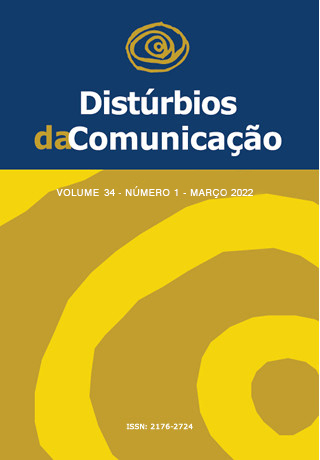Therapeutic Journeys of family members of children with Congenital Zika Syndrome in the metropolitan region of Salvador/Bahia
DOI:
https://doi.org/10.23925/2176-2724.2022v34i1e54103Keywords:
Zika Virus Infection, Microcephaly, Delivery of Health CareAbstract
Introduction: The living and health conditions of children with Congenital Zika Syndrome (CZS) are an important public health issue. Neurodevelopment changes impact family life and imply multi and interdisciplinary care. Therefore, studies on the therapeutic journeys of family members in search for health care and education are needed. Objective: To investigate the therapeutic journeys of family members of children with SCZV in the metropolitan region of Salvador/Bahia. Methods: Descriptive and cross-sectional study with a qualitative approach, including recording, transcribing and analyzing videos of interviews with eight family members. The following thematic axes were defined: knowledge and impact of diagnosis, search and support in healthcare and educational inclusion. Results: Most family members became aware of the diagnosis of CZS only after the birth. All received guidance and referrals, mainly from public health professionals. The children were referred to different specializations and received priority assistance. Some participants reported anguish receiving the diagnosis, changes in dynamics and family life, long waiting for a wheelchair, difficulties to access specialized institutions due to distance and lack of transportation, and problems in educational inclusion due to the lack of classroom assistants. Most family members reported having support from relatives and friends. Conclusion: The findings show the impacts of therapeutic journeys on the lives of these families and the difficulties faced due to the effects on the neurodevelopment of children in search for assistance. The results suggest the need to formulate public policies in line with the needs of these children.
Downloads
References
Brunoni D, Blascovi-Assis S M, Osório AAC, Seabra AG, Amato CAH, Teixeira MCTV et al. Microcefalia e outras manifestações relacionadas ao vírus Zika: impacto nas crianças, nas famílias e nas equipes de saúde. Ciênc. saúde coletiva. 2016; 21(10): 3297-302.
Scott RP, Lira LC, Matos SS, Souza FM, Silva ACR, Quadros MT. Itinerários terapêuticos, cuidados e atendimento na construção de ideias sobre maternidade e infância no contexto da Zika. Interface. 2018; 22(66): 673-84.
ZIKALAB. Manual técnico: Laboratório de formação do trabalhar de saúde no contexto do vírus Zika. 2018: 182.
Souza AMCP, Souza GL, Hamburgo JS, Cardoso MM. Perspectivas atuais e prognóstico motor sobre a Síndrome Congênita do Zika vírus.Rev. Eletrôn. Atualiza Saúde. 2018; 7(7): 33-44.
BRASIL. Protocolo de atenção à saúde e resposta à ocorrência de microcefalia relacionada à infecção pelo vírus Zika. Ministério da Saúde, Secretaria de Atenção à Saúde. 2016: 45.
Del Campo M, Feitosa IM, Ribeiro EM, Horovitz DD, Pessoa AL, França GV, et al. The phenotypic spectrum of congenital Zika syndrome. Am J Med Genet A. 2017; 173(4): 841–57.
Eickmann SH, Carvalho MDCG, Ramos RCF, Rocha MAW, Linden VVD, Silva PFS. Síndrome da infecção congênita pelo vírus Zika. Cad. Saúde Pública. 2016; 32(7): 1-3.
Teixeira GA, Dantas DNA, Carvalho GAFL, Silva AN, Lira ALBC, Enders BC. Análise do conceito síndrome congênita pelo Zika vírus.Ciênc. saúde coletiva. 2020; 25(2): 567-74.
Silva AAM, Ganz JSS, Sousa PS, Doriqui MJR, Ribeiro MRC, Branco MRFC et al. Early growth and neurological outcomes of infants with probable congenital Zika virus syndrome. Emerging Infectious Diseases. 2016; 22(11): 1953-6.
Souza LEC, Lima TJS, Ribeiro EM, Pessoa ALS, Figueiredo TC, Lima LBP. Mental health of parents of children with Congenital Zika Virus Syndrome in Brazil. Journal of Child and Family Studies.2018; 17(4): 1207-15.
França TLB, Medeiros WR, Souza NL, Longo E, Pereira SA, França TBO et al. Growth and Development of Children with Microcephaly Associated with Congenital Zika Virus Syndrome in Brazil.Int. J. Environ. Res. Public Health. 2018; 15(9): 1-11.
Kotzky K, Allen JE, Robinson LR, Satterfield-Nash A, Bertolli J, Smith C et al. Depressive symptoms and care demands among primary caregivers of Young children with evidence of congenital Zika virus infection in Brazil. J DevBehavPediatr. 2019; 40(5): 344-53.
Martins LA, Silva TCC, Santos HAS, Aguiar ACSA, Whitaker MCO, Camargo CL. Itinerário terapêutico de crianças quilombolas com doença falciforme. CiencCuidSaude. 2019; 18(2): 1-8.
Fraser B, Alves L. Living with the consequences of Zika virus disease. The Lancet Child & Adolescent Health. 2019; 3:215-6.
Garcia LP. Epidemia do vírus Zika e microcefalia no Brasil: emergência, evolução e enfrentamento. Ipea. 2018: 62.
Ministério da Saúde. Ministério da Saúde anuncia fim da Emergência em Saúde Pública para Zika. 2017 maio [acesso em abril 2021]. Disponível em: http://www.saude.gov.br/noticias/svs/28348-ministerio-da-saude-declara-fim-da-emergencia-nacional-para-zika-e-microcefalia.
Moore CA, Staples JE, Dobyns WB, Pessoa A, Ventura CV, Fonseca EB et al. Characterizing the Pattern of Anomalies in Congenital Zika Syndrome for Pediatric Clinicians. JAMA Pediatr. 2017; 171(3): 288-95.
Turato ER. Métodos qualitativos e quantitativos na área da saúde: definições, diferenças e seus objetos de pesquisa. Rev. Saúde Pública. 2005; 39(3): 507-14.
Baptista R. BPC é um dos pontos polêmicos da reforma da Previdência. Brasília. Senado Federal. 2019 [acesso em abril 2021]. Disponível em: https://www12.senado.leg.br/noticias/materias/2019/05/09/bpc-e-um-dos-pontos-polemicos-da-reforma-da-previdencia/#conteudoPrincipal.
Freitas PSS, Soares GB, Mocelin HJS, Lacerda LCX, Prado TN, Sales CMM et al. Síndrome congênita do vírus Zika: perfil sociodemográfico das mães. Rev Panam Salud Publica. 2019; 43(24): 1-7.
Oviedo RAM, Czeresnia D. O conceito de vulnerabilidade e seu caráter biossocial. Interface. 2015; 19(53): 237-50.
Campos GWS. SUS: o que e como fazer?.Ciênc. saúde coletiva. 2018; 23(6): 1707-14.
Folha DRSC, Marini BPR, Nunes AC, Braba PCSD. Terapia Ocupacional e a atenção a crianças com Síndrome Congênita do Zika Vírus na perspectiva da Intervenção Precoce.Revista Argentina de Terapia Ocupacional. 2018; 4(1): 30-9.
Brasil. Clínica Ampliada, Equipe de Referência e Projeto Terapêutico Singular. Ministério da Saúde. 2.ª ed. 2008: 9-56.
Downloads
Published
Issue
Section
License
Copyright (c) 2022 Ana Carolina Girardo, Paula Mello Pereira Passos, Regina Yu Shon Chun

This work is licensed under a Creative Commons Attribution 4.0 International License.









